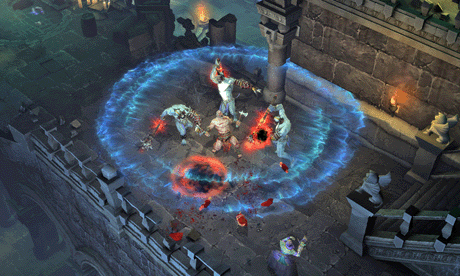
If you're a fan of Blizzard's action RPG series, you'll no doubt already have heard: Diablo III is set to feature an auction house in which players are able to buy and sell in-game goods for real money. Although this sort of activity is already rife within online games, it's usually carried out as a "grey economy" with "gold farmers" using third-party sites and software. Here, the auction feature is integrated into the game, and Blizzard will receive a transaction fee on every item sold.
"It was definitely a design decision," the game's lead designer, Jay Wilson, has told Eurogamer. "Certainly there's an economic element to the auction house for us, but it came first and foremost as: what do we want to do for the players? What service can we possibly offer that would make the game experience better?"
But there will no doubt be concerns among fans of the series. The practise of gold farming – in which professional gamers grind through popular online multiplayer titles like World of Warcraft, earning in-game currency and items and then selling them to other players – has had a profound effect on the nature of the genre. By making it possible for inexperienced participants to buy the best items and weapons, some fans argue that the whole sense of balance and progression is lost, and that virtual worlds become top-heavy with floundering newbies struggling to use equipment that they should have earned over months of judicious gameplay.
Blizzard's argument is that by taking the auction process inhouse, the company will be able to manage the process, ensuring that players aren't ripped off by unscrupulous traders, or confused by third-party auction systems. The studio has also pointed out that it won't be selling items itself – it's merely acting as a conduit for player transactions. Which is a smart move – few developers will forget the ruckus Bethesda caused in 2006 when it tried to charge players of the Elder Scrolls: Oblivion game for downloadable horse armour.
But by officially validating the concept of buying in-game goods that would otherwise have only been available to experienced players, has Blizzard crossed an important line, in terms of design and monetisation? Wilson states that the auction house won't change the way that Diablo functions as a game, but if it's an enormous financial success, surely there will be tacit pressure on designers to introduce a greater number of saleable items, or make the hasty acquisition of certain weapons and armour pieces more attractive?
Furthermore, Blizzard's decision to authorise real-money transactions – and Diablo III is the first mainstream title to do so – will also be watched with interest by other studios. Of course, there are huge design differences between RPG titles and, say, first-person shooters, but will a successful Diablo III auction house open up the possibility of weapons trading in Call of Duty, or used-car lots in Need for Speed?
A World Bank report on gold farming found that the practise was worth £3bn in 2009 – that's surely an enticing figure for publishers looking to squeeze all the income they can out of their multi-million-dollar productions.
We're certainly in a weird era for game design. The whole concept of micro-transactions, fed by the free-to-play revolution, will unavoidably have an impact on the way game experiences are structured; it's impossible to truly benefit from the digital economy without it shaping (or as some would put it, 'tainting') your product in subtle – and not-so-subtle – ways. Will Diablo III's auction house prove to be a significant step toward the wholesale monetisation of mainstream virtual worlds? Will our avatars inevitably transform from warriors to salesmen?

